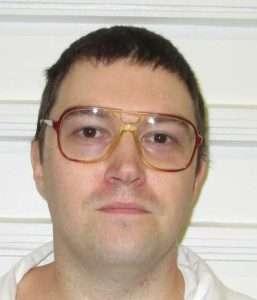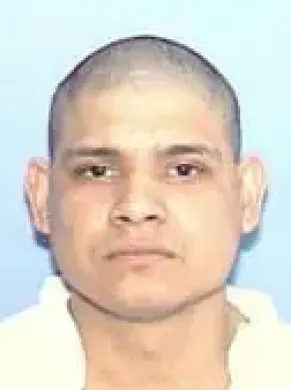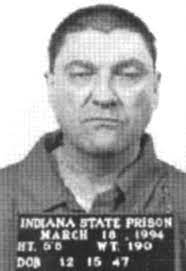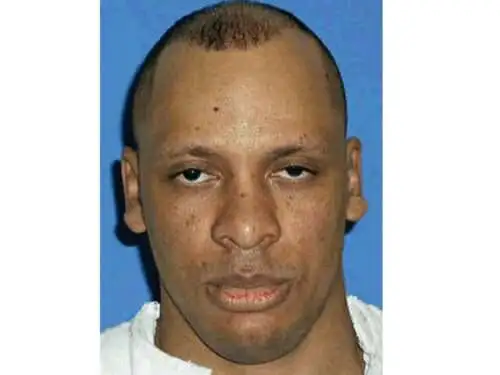David Wilson Murders Dewey Walker In Alabama
David Wilson was sentenced to death by the State of Alabama for the murder of Dewey Walker
According to court documents David Wilson would beat to death Dewey Walker, who was suffering from cancer, with a baseball bat and strangled him
David Wilson was arrested, convicted and sentenced to death
David Wilson Photos

David Wilson Now
| Inmate: | WILSON, DAVID PHILLIP |
| AIS: | 0000Z748 |
| Institution: | HOLMAN PRISON |
David Wilson Case
David Phillip Wilson appeals his two capital-murder convictions and sentences of death. Wilson was convicted of one count of capital murder for taking the life of Dewey Walker during the course of a robbery, see § 13A–5–40(a)(2), Ala.Code 1975, and a second count of capital murder for taking the life of Dewey Walker during the course of a burglary, see § 13A–5–40(a)(4), Ala.Code 1975. By a vote of 10–2, the jury recommended that Wilson be sentenced to death. The circuit court accepted the jury’s recommendation and sentenced Wilson to death.
After Walker, a 64–year–old man suffering from cancer, failed to show up for work for several consecutive days in April 2004, his supervisor, Jimmy Walker,1 went to his house to check on him. After two trips to check on Walker were unsuccessful, Jimmy Walker spoke with Walker’s neighbor, and the neighbor telephoned the police. On April 13, Officer Lynn Watkins and Officer Rhett Davis of the Dothan Police Department responded to the call and conducted a “welfare check” at Walker’s house.
During the welfare check, Officer Watkins walked around to the back of the house. The back of the house had two doors, a wooden door and a sliding-glass door. Officer Watkins noticed that the door knob to the wooden door was missing. She entered through that doorway and found herself in a storage area, separated from the primary residence by a panel of drywall. The wall had a hole in it leading to a bedroom. It appeared to Officer Watkins that someone had created the hole from the outside because there was broken drywall on the bedroom floor. Officer Watkins entered the bedroom through the hole in the drywall. She testified at trial that, in her opinion, the hole was large enough for Wilson. Officer Watkins and Officer Davis conducted a search of Walker’s residence. Walker’s body was found in the kitchen with a large amount of dried blood surrounding his head.
Investigator Tony Luker of the Dothan Police Department was assigned to investigate Walker’s death. In addition to the blood found near Walker’s body, Investigator Luker discovered blood droplets throughout the house. He also discovered that the doors to multiple bedrooms, which apparently had been locked, were pried open and that there were holes in the walls of several rooms. Investigator Luker testified that it appeared as though someone had been searching for something hidden in the walls.2
In the kitchen, Investigator Luker recovered an extension cord and a computer-mouse with the attached cord snapped in to two pieces, which, based on the ligature marks on Walker’s neck and the dried blood on the cords, appeared to have been used to strangle Walker. Investigator Luker also found a screwdriver and a portion of the computer-mouse cord in the refrigerator.
Investigator Luker also noticed that Walker’s custom van, replete with stereo equipment estimated to be worth $20,000, was missing. A search for the van and the stereo equipment led investigators to Matthew Marsh. Investigator Luker interviewed Marsh, and then interviewed Catherine Corley and Michael Jackson. These interviews led Investigator Luker to Wilson.
Officers arrived at David Wilson’s home in the early morning hours of April 14. Wilson voluntarily went with the officers to the Dothan Police Department. After waiving his Miranda3 rights, Wilson gave a statement to Investigator Luker and Sergeant Mike Etress.
David Wilson told the officers that he went to Walker’s house around 3 p.m. on April 6. Walker was home, and Wilson spoke to him about Walker’s son Chris. Wilson left, but came back a few hours later. Wilson said that the front door was partially open when he returned, so he walked into the house. Walker was not home when Wilson arrived. While Wilson was inside Walker’s house, he received a telephone call from Marsh, asking him to steal the keys to Walker’s van. Wilson explained to the officers that he, Marsh, Jackson, and Corley had previously discussed “hitting Mr. Walker and knocking him out and taking the keys.” (C. 517.) Wilson took the keys and went to Marsh’s house.
According to David Wilson, he returned to Walker’s house the next evening to steal a laptop computer. He went to the back of the house and entered the storage area. Wilson stated that there was a small crack in the wall and that he made it large enough to enter the main house. Wilson took a metal baseball bat with him because, according to him, he was scared of Walker’s dog.4 Once inside, he again received a telephone call from Marsh asking him to search for items in addition to the laptop that would be worth stealing. Wilson used a screwdriver to pry open several doors in the house.
After approximately 20 minutes, Walker returned home and went to the kitchen. David Wilson assumed that Walker heard him because he picked up a knife.5 Wilson said that he approached Walker from behind with the baseball bat and attempted to disarm Walker by striking him on his right shoulder. According to Wilson, he missed and accidentally struck Walker in the back of his head. Walker fell into the wall, cutting his head, but stood back up. Wilson grabbed a nearby computer-mouse cord and wrapped it around Walker’s neck in an attempt to make Walker drop the knife. The computer-mouse cord snapped, so David Wilson grabbed a nearby extension cord. Wilson stated that he wrapped the extension cord around Walker’s neck and held it until Walker passed out. He estimated that he choked Walker for six minutes. Wilson told the officers that he threw the extension cord down in front of the refrigerator and placed the computer-mouse cord inside the refrigerator. Wilson was scared, so he left the house, taking with him Walker’s laptop and one of Walker’s baseball hats. Wilson further indicated that he did not telephone an ambulance for Walker because he was in a state of panic. According to Wilson, Walker was still breathing when he left.
David Wilson went back to Marsh’s house where he, Marsh, and Corley unsuccessfully attempted to login to Walker’s password-protected laptop. The three individuals then went back to Walker’s house in order to steal the van. During their first attempt to take the van, however, the alarm on the van went off, so they left.
David Wilson made similar attempts to steal Walker’s van on Thursday and Friday, but was foiled both times by the alarm on the van. Wilson spoke with Corley, who was familiar with alarm systems, about disabling the alarm in Walker’s van. Wilson returned to the van on Sunday morning. He lifted the hood of the van to access the alarm system, and the alarm again sounded. Wilson left and drove around for about 20 minutes before returning. When he returned, he was able to disable the alarm system by cutting two wires. Wilson drove to Marsh’s house, picked up Marsh, and drove back to Walker’s house. Wilson drove the van to Marsh’s house. At Marsh’s house, they removed the stereo equipment from the van and split it among David Wilson,6 Marsh, Jackson, and Corley. Then they hid the van on Marsh’s property located outside the city limits of Dothan.
Dr. Kathleen Enstice, who at the time of Walker’s death was a forensic pathologist with the Alabama Department of Forensic Sciences, performed Walker’s autopsy. The results of the autopsy conflicted with Wilson’s account of a single, accidental blow to Walker’s head. Dr. Enstice testified that Walker had fresh defensive wounds on his hands and arms. She gave a conservative estimate of 114 contusions and abrasions on Walker’s body, 32 of which were on his head. Additionally, Walker had multiple skull fractures and three separate lacerations on his scalp. Walker also suffered eight broken ribs and a fracture to his sternum. Dr. Enstice ruled out the possibility that these injuries could have been sustained by a single blow to the head and a subsequent fall.
https://caselaw.findlaw.com/court/al-court-of-criminal-appeals/1596702.html














